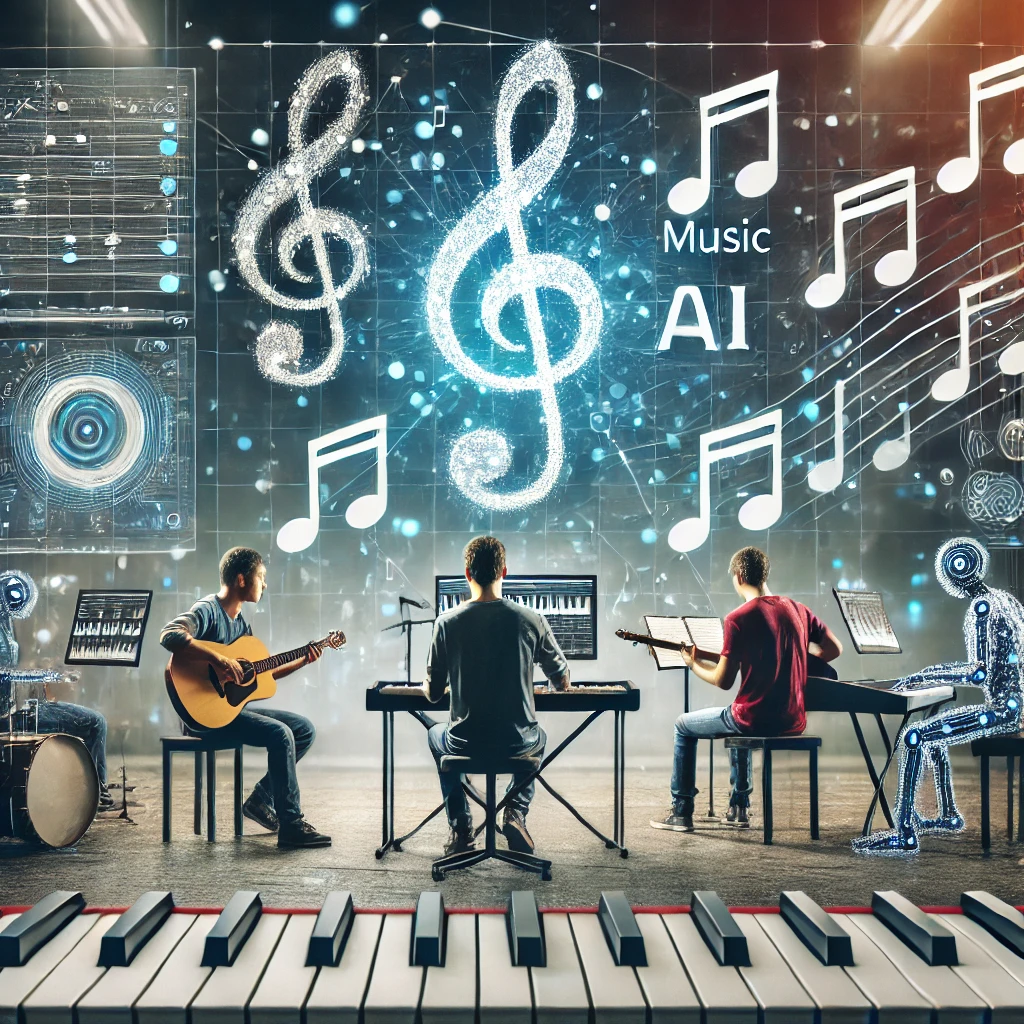7 Key Benefits and Future Trends in AI Music Composition: Boost Creativity and Efficiency
AI music composition is transforming how music is created, offering both efficiency and creative enhancement. These tools utilize machine learning algorithms to analyze vast amounts of musical data, learning patterns and styles from various genres to generate original compositions.
The 7 key benefits and future trends in AI music composition demonstrate how this technology can boost creativity and efficiency in the music industry.

Contents
Benefits of AI Music Composition
- Enhanced Efficiency and Cost-Effectiveness: AI-powered tools can automate repetitive tasks in music production, such as beat matching, audio editing, and mastering. This not only saves time but also reduces production costs, allowing musicians to allocate resources more efficiently (EMB Blogs).
- Creativity and Innovation: AI helps push the boundaries of traditional music composition by suggesting novel ideas and experimenting with different genres and styles. This can result in unique and innovative music that might not have been possible through conventional methods (Vitrina).
- Real-Time Feedback and Analysis: AI tools provide instant feedback and analysis on musical compositions. This real-time input allows composers to refine their work and make informed decisions, enhancing the overall quality of the music (Content Geni).
- Overcoming Creative Blocks: AI can assist musicians in overcoming creative blocks by generating chord progressions, melodies, and harmonies. This collaborative aspect of AI fosters inspiration and allows composers to explore new musical territories (Content Geni).
How AI Music Composition Works
AI music composition tools are typically trained on large datasets of existing music, including thousands of songs from various genres and eras. The AI analyzes these datasets to understand patterns like chord progressions, rhythms, and melodies. Once trained, the AI can generate new music by extrapolating from these learned patterns (MusicRadar).
Use Cases for AI-Generated Music
- Content Creation: Content creators on platforms like YouTube and Twitch use AI-generated music to enhance their videos and streams without worrying about copyright issues.
- Business Branding: Businesses use bespoke AI-generated music for branding and marketing campaigns, ensuring their audio content is unique and tailored to their needs.
- Gaming: In the gaming industry, AI-generated music provides dynamic soundtracks that adapt to the player’s actions, creating a more immersive experience.
- Film Scoring: Filmmakers use AI-generated music to quickly create temp scores during the editing process, which can later be refined or replaced with final compositions (MusicRadar) (Content Geni).
The Future of AI in Music Composition
The future of AI in music composition looks promising. As AI technology continues to advance, it will provide even more sophisticated and versatile music composition tools. These tools will assist human composers and collaborate with them, blending human creativity with machine efficiency. This evolution will expand the boundaries of what is possible in the world of music (EMB Blogs) (Vitrina).
Getting Started with AI Music Composition
Several tools are available for those interested in exploring AI music composition, catering to different needs and skill levels. Beginners can start with user-friendly platforms like Amper Music, which provides a straightforward interface for creating music. More advanced users might explore tools like AIVA or OpenAI’s MuseNet, which offer greater control and customization (MusicRadar) (Vitrina).
By leveraging these AI-driven strategies, musicians and music businesses can unlock new revenue streams and thrive in the evolving music industry.
Recommend Book
Rethinking Writing Instruction in the Age of AI: A Universal Design for Learning Approach.
This book is impressively informative, exceptionally well written, deftly organized, and thoroughly’ reader-friendly in presentation.

In a rethinking of writing education in the AI era, Lyst offers composition instructors insight into practical ways to address AI panic and how to accept it as an opportunity to strengthen writing and critical thinking skills.
In addition, Lyst shows how Universal Design for Learning provides a framework to help solve writing courses and support education. This book is not only engaging but also offers many real-world writing activities that offer “AI proofs.”


